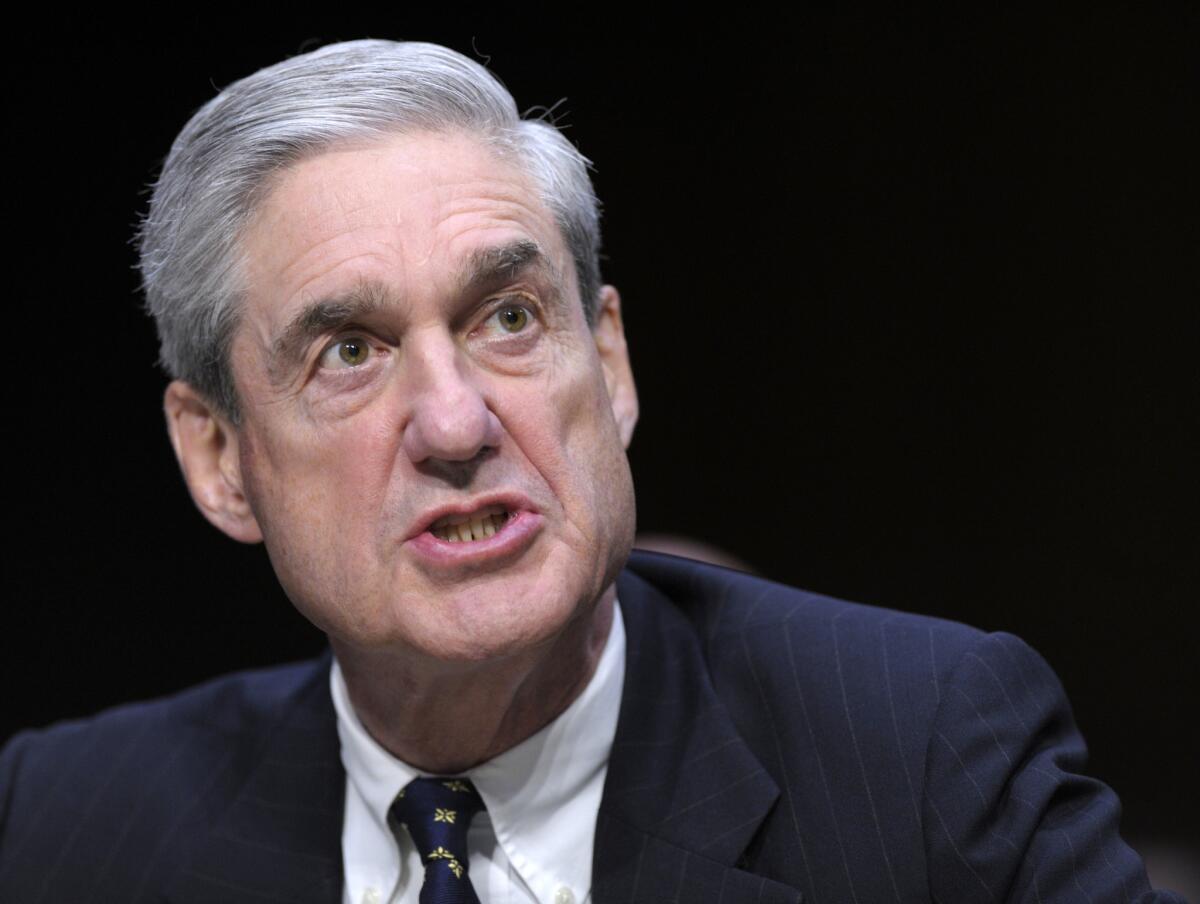Justice Department appoints special prosecutor for Russia investigation

- Share via
The Justice Department on Wednesday named a special counsel, former FBI Director Robert Mueller III, to take over the investigation of Russian meddling in the 2016 election and possible collusion between Russian agents and associates of President Trump.
The move heightened the legal and political stakes for the president and his young administration. It came after days of allegations against Trump raised new questions about whether administration officials could oversee a probe which has the president at its center.
“My decision is not a finding that crimes have been committed or that prosecution is warranted,” Deputy Atty. Gen. Rod J. Rosenstein said in announcing the appointment. “I have made no such determination.”
But, he said, a special counsel is necessary in order for the “American people to have full confidence in the outcome” of the investigation.
“The public interest requires me to place this investigation under the authority of a person who exercises a degree of independence from the normal chain of command,” Rosenstein wrote.
The president, in a statement, reiterated his insistence that he is innocent of wrongdoing.
“As I have stated many times, a thorough investigation will confirm what we already know – there was no collusion between my campaign and any foreign entity,” Trump said.
“I look forward to this matter concluding quickly. In the meantime, I will never stop fighting for the people and the issues that matter most to the future of our country.”
Rosenstein, who is overseeing the Russia investigation because Atty. Gen. Jeff Sessions recused himself, did not inform either the White House or Sessions about the decision until after he had signed the order appointing Mueller, according to a Justice spokesperson who spoke on condition of anonymity.
About a half hour before the order was made public, a Justice official informed White House counsel Don McGahn. Trump’s spokesperson Sean Spicer abruptly left a scheduled meeting with reporters as White House aides huddled to draft a response.
As recently as Monday, Spicer had insisted that “there’s frankly no need for a special prosecutor” when reporters pressed him about calls in Congress for such an appointment.
Mueller, a former federal prosecutor who served as U.S. attorney in San Francisco under President Bill Clinton and was named FBI director by President George W. Bush, is well regarded as a non-partisan figure. He was FBI director for 12 years, kept on by President Barack Obama.
In the Bush administration, Mueller worked closely with James B. Comey, his successor as FBI director, who was fired last week by Trump.
His appointment drew praise from Democrats who have been demanding an independent counsel.
“Rosenstein has done the right thing.” Senate Democratic Leader Charles Schumer of New York said.
“I now have significantly greater confidence that the investigation will follow the facts wherever they lead.”
House Democratic leader Nancy Pelosi offered more measured approval.
“A special prosecutor is the first step, but it cannot be the last,” she said. “He cannot take the place of a truly independent, outside commission that is completely free from the Trump administration’s meddling.”
Sen. Dianne Feinstein, a Democrat who knows Mueller well from his years in the Bay area, her base, said there was “no better person who could be asked to perform this function. He is respected, he is talented and he has the knowledge and ability to do the right thing.”
John Ashcroft, the former Attorney General under Bush, who worked with Mueller in the chaotic first days after the Sept. 11, 2001 terror attacks, praised him in an interview on Wednesday.
“It’s impossible to think about Washington without politics blowing people off course,” Ashcroft said. “But if anyone can stay on course and not be deterred by the whims of politics, it’s Bob Mueller.”
“He won’t be swayed by the barking dogs. He’ll go after the facts.”
Some Republicans, however, were nonplussed.
“It’s fine,” said Rep. Pete King of New York, who called Mueller a “solid guy.”
“I just don’t think there is any need for it.”
Mueller will have the ability to hire a staff and request a budget from the Department of Justice. He will resign from his law firm, WilmerHale.
The appointment is only the second time that those special counsel rules have been invoked.
The first was the 1999 appointment of former U.S. Senator Jack Danforth to probe the deadly siege of the Branch Davidian compound in Waco, Texas.
Patrick Fitzgerald’s investigation into the leaking by the White House of a clandestine CIA operative’s name wasn’t made under this rule since Fitzgerald was already working for the Department of Justice.
UPDATES:
5:10 p.m.: This article was updated with new details and reaction.
3:30 p.m.: This article was updated with additional detail.
This article was originally published at 3 p.m.
More to Read
Sign up for Essential California
The most important California stories and recommendations in your inbox every morning.
You may occasionally receive promotional content from the Los Angeles Times.














